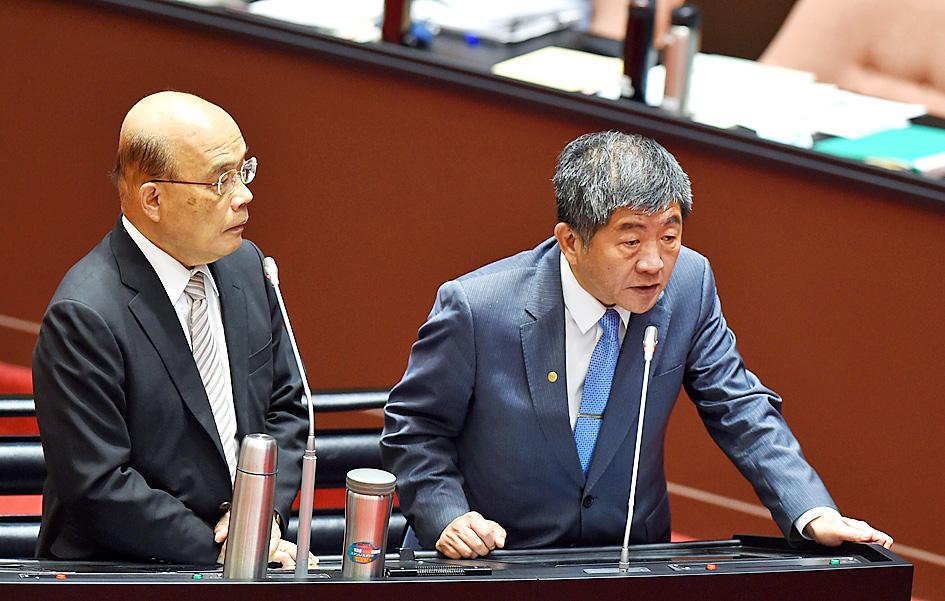Premier Su Tseng-chang (蘇貞昌) yesterday urged legislators to swiftly approve an additional NT$210 billion (US$7.17 billion) to maintain government subsidy programs keeping companies afloat during the COVID-19 pandemic.
It is the second increase of special funding for the Special Act on COVID-19 Prevention, Relief and Recovery (嚴重特殊傳染性肺炎防治及紓困振興特別條例), with the first, valued at NT$150 billion, approved on May 9.
Answering legislators’ questions at the Legislative Yuan, Su said that NT$38.3 billion would go toward pandemic prevention, specifically the purchase and research and development (R&D) of vaccines targeting the SARS-CoV-2 strain.

Photo: Liu Hsin-de, Taipei Times
It would also cover compensation for pandemic prevention efforts, purchasing drugs and other goods used for prevention, stepping up border patrols, maintaining quarantine facilities and compensating local governments, he said.
The remaining NT$171 billion would be used to maintain the Triple Stimulus Voucher program, promote loans and financing measures for small and medium-sized businesses, fund commercial-use electricity subsidies, extend subsidies for employees at companies or in industries heavily affected by the pandemic, fund subsidies to keep businesses afloat and continue R&D programs, Su said.
More than 13.3 million Taiwanese have benefited from the act’s original NT$60 billion in funding and the first special budget increase, Su said, adding that 110,000 companies have been kept afloat and 900,000 employees retained.
To date, 22.65 million people have picked up vouchers, demonstrating the program’s success, he added.
The government has allocated NT$161.1 billion from the NT$210 billion in funding already approved by the legislature, but has only spent NT$151.9 billion, or 94 percent, of the budgeted funding, Su said, adding that the government has only spent the funding where needed.
Directorate-General of Budget, Accounting and Statistics Minister Chu Tzer-ming (朱澤民) said that the Ministry of Economic Affairs would take the lion’s share, NT$137.54 billion, of the newly requested funds, followed by the Ministry of Health and Welfare, with NT$37.36 billion.
The Council of Agriculture is requesting NT$19.11 billion, while the Ministry of Labor is asking for NT$4.79 billion, Chu said.
The National Communications Commission is asking for NT$271.4 million, while the Ministry of the Interior and the Ministry of Education are requesting NT$638.55 million and NT$640 million respectively, he said.
Separating funding by category, NT$166.4 billion would be used for economic development and NT$43.58 billion for social welfare, Chu said, adding that the additional funding would be provided by raising debt.
In related news, Taiwan can obtain vaccines through self-development, international purchases or international collaboration, Su said, adding that regardless of the method, Taiwan would prioritize domestic needs.
Minister of Health and Welfare Chen Shih-chung (陳時中) said the government on Friday last week signed a contract with the Vaccine Global Access Facility (COVAX) platform, and would pay a deposit for vaccines next month. He did not specify the amount of the deposit.
COVAX is a global initiative led by the WHO, the Coalition for Epidemic Preparedness Innovations and Gavi, the Vaccine Alliance, to accelerate the development and manufacture of COVID-19 vaccines, and to guarantee fair and equitable access for every country.
Additional reporting by Chen Yun and CNA

ACTION PLAN: Taiwan would expand procurement from the US and encourage more companies to invest in the US to deepen bilateral cooperation, Lai said The government would not impose reciprocal tariffs in retaliation against US levies, President William Lai (賴清德) said yesterday, as he announced five strategies to address the issue, including pledging to increase Taiwanese companies’ investments in the US. Lai has in the past few days met with administrative and national security officials, as well as representatives from various industries, to explore countermeasures after US President Donald Trump on Wednesday last week announced a 32 percent duty on Taiwanese imports. In a video released yesterday evening, Lai said that Taiwan would not retaliate against the US with higher tariffs and Taiwanese companies’ commitments to

Intelligence agents have recorded 510,000 instances of “controversial information” being spread online by the Chinese Communist Party (CCP) so far this year, the National Security Bureau (NSB) said in a report yesterday, as it warned of artificial intelligence (AI) being employed to generate destabilizing misinformation. The bureau submitted a written report to the Legislative Yuan in preparation for National Security Bureau Director-General Tsai Ming-yen’s (蔡明彥) appearance before the Foreign Affairs and National Defense Committee today. The CCP has been using cognitive warfare to divide Taiwanese society by commenting on controversial issues such as Taiwan Semiconductor Manufacturing Co’s (TSMC, 台積電) investments in the

‘SPECIAL CHANNEL’: Taipei’s most important tasks are to stabilize industries affected by Trump’s trade tariffs and keep negotiations with Washington open, a source said National Security Council Secretary-General Joseph Wu (吳釗燮) arrived in the US for talks with US President Donald Trump’s administration, a source familiar with the matter said on Friday. Wu was leading a delegation for a meeting known as the “special channel,” the Financial Times reported earlier. It marked Trump’s first use of the channel since returning to the White House on Jan. 20. Citing a source familiar with the matter, the Financial Times reported that Minister of Foreign Affairs Lin Chia-lung (林佳龍) was also a part of the delegation. The visit came days after China concluded war games around Taiwan and amid Trump’s

HELPING HAND: The steering committee of the National Stabilization Fund is expected to hold a meeting to discuss how and when to utilize the fund to help buffer the sell-off The TAIEX plunged 2,065.87 points, or 9.7 percent, to close at 19,232.35 yesterday, the highest single-day percentage loss on record, as investors braced for US President Donald Trump’s tariffs after an extended holiday weekend. Amid the pessimistic atmosphere, 945 listed companies led by large-cap stocks — including Taiwan Semiconductor Manufacturing Co (TSMC, 台積電), Hon Hai Precision Industry Co (鴻海精密) and Largan Precision Co (大立光) — fell by the daily maximum of 10 percent at the close, Taiwan Stock Exchange data showed. The number of listed companies ending limit-down set a new record, the exchange said. The TAIEX plunged by daily maxiumu in just